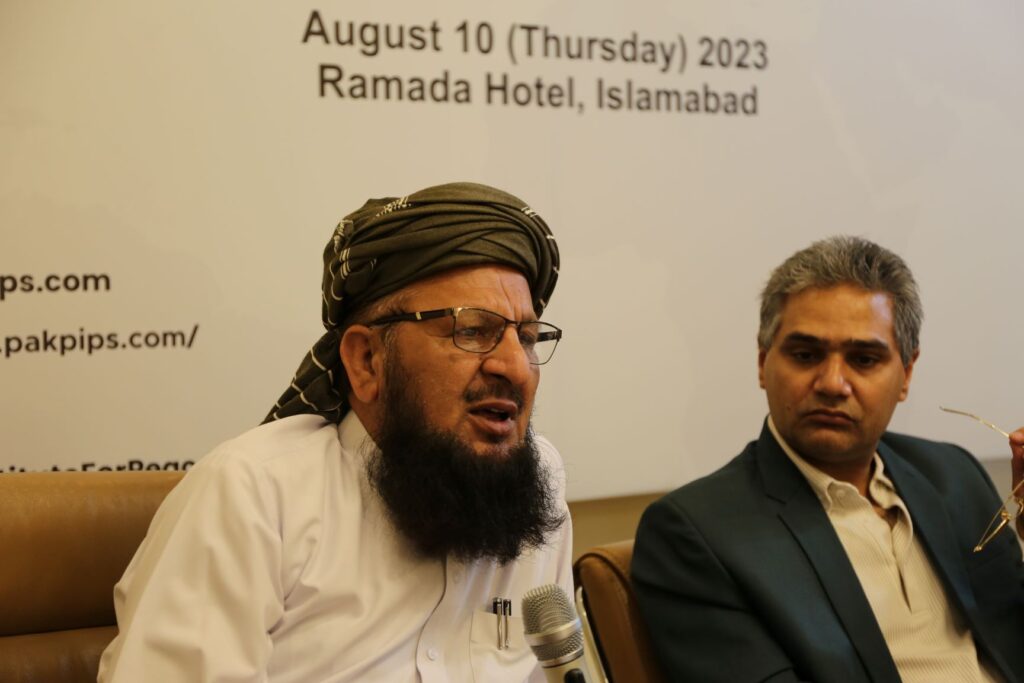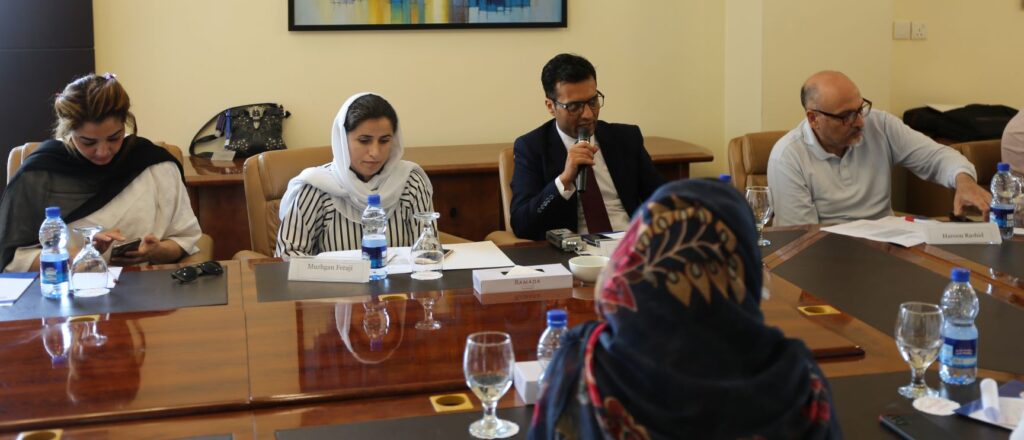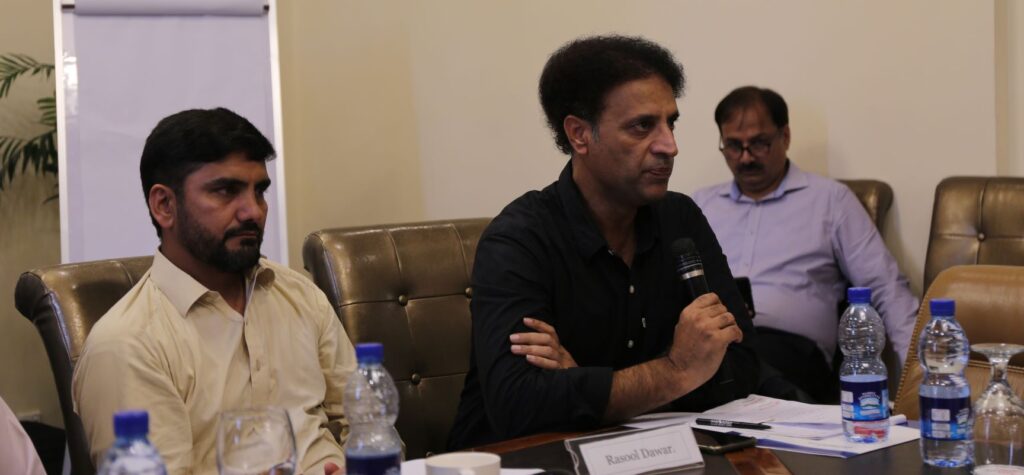Pips consultation-9 on afghan peace & reconciliation
Pak Institute for Peace Studies (PIPS) organized 9th quarterly consultation on “Afghan peace and reconciliation: Pakistan’s interests and policy options” in Islamabad on August 10, 2023. The main themes of the consultation included ‘Rising terrorism threat from TTP, IS-K (Islamic State Khorasan) and other groups’ and ‘The TTP as a major irritant in Pak-Afghan ties.’ The event was attended by academics, politicians, journalists, religious scholars, human rights activists, and experts on Afghan affairs, from Pakistan and Afghanistan.
Initiating the consultation, Director PIPS Muhammad Amir Rana said that the purpose of the discussion is to review Pakistan’s options to deal with the Afghan Taliban in terms of countering the TTP threat and Pakistan’s existing policy towards Afghanistan. He added that a recent upsurge in terrorism in Pakistan has led to bitterness in Pak-Afghan relations and the session would examine how the situation could be defused.
The speakers said that both Pakistan and Afghanistan should start fresh negotiations to break the ongoing deadlock on the issue of hideouts of banned Tehreek-e-Taliban Pakistan (TTP) and its cross-border terrorism. They lamented that Pakistan lacked continuity in its policy towards Afghanistan and added that Islamabad should form a “realistic and holistic” policy for the neighboring country, which must be brought into the public domain to make it more productive.
The discussants said that Pakistan should avoid talking to the interim government of Taliban in a “tough tone” as negotiations are the only way forward. They observed that the role of ulema is crucial in this regard. They said Pakistan’s initiative of fencing the Pak-Afghan border could not fully succeed in stopping cross-border terrorism from Afghanistan and it should enhance its capacity to prevent such violence.
Editor and analyst, Haroon Rashid, taking part in the discussion said that the issue of TTP was the basic impediment in bilateral relations between Pakistan and Afghanistan. “There is a deadlock on the matter, which will persist as long as both sides don’t find a solution to the problem,” he said, adding that the common man is suffering the most in the present situation. He underlined that Pakistan would have to work on some strategy to weaken the proscribed TTP.
Mufti Muhammad Qasim Haqqani, central leader of Jamiat Ulema-e-Islam-Fazl (JUI-F) in Chaman (Balochistan), suggested that a delegation of local religious scholars and Pashtun leadership should meet with Afghan Taliban in Kabul to discuss with them all the issues between the two countries, including the TTP. “Separate conferences of ulema of Pakistan and Afghanistan should be held in Kabul and Islamabad to debate and resolve issues between both the countries,” he also said.
Afghan-based journalist and educationist, Muzhgan Feraji, talked about the right of education and employment being denied to women in Afghanistan by the Taliban regime in Kabul. “If women have the right to education and employment in Islamic countries like Pakistan and Saudi Arabia, then why cannot they get these rights in Afghanistan,” she questioned. She emphasized that the Afghan Taliban does not believe in any component of human rights.
Hashmat Vejdani, a senior member of the USIP research team on peace and reconciliation in Afghanistan, said that the Taliban are not committed to any promises they have made and have broken all the promises. The Taliban are corrupt as the former Afghan politicians, the difference is that only the costume has changed, he remarked.
Afghan (women) rights activist, Zohra Wahedi Akhtari, deplored that the lives of women and girls are miserable under the present government in Afghanistan and added that they have become victims of the Taliban regime. “Taliban have closed all doors of development on Afghan women,” she said.
Ameer Jamaat-e-Islami Balochistan, Maulana Abdul Haq Hashmi, said: “First of all, there is a need to understand the ideological basis of the Afghan Taliban and the TTP.” He said that both does not accept the modern democratic system and there is a need to discuss and address this issue as well.
Shahzada Zulfiqar, a Quetta-based senior journalist and ex-president PFUJ, remarked that the TTP gets support in the Brahui speaking areas but not in the Balochi speaking areas. Talking about the policymaking on countering terrorism, he suggested that the civilian leadership should also be made part of it.
Rasool Dawar, a journalist based in North Waziristan, expressed his worries about target killings in Waziristan and said that it is rising. “The terrorists can be stopped from crossing the border but nobody in Pakistan is concerned about it”, he said further.
Afghan-based journalist, Sami Yousafzai, argued that Islamabad should not be harsh on Kabul over the issue of the presence of TTP militants in Afghanistan. He said that Pakistan must avoid giving hard-hitting statements against the Taliban regime as they have the leverage to create problems for Pakistan.
Saeedullah Marwat, the Bureau Chief of Geo News in Dera Ismail Khan, said that Pakistan’s policies are inconsistent. Talking about CPEC, he said that it has impacted Pakistan and its policies. “Pakistan’s neighbors are fed up with it and so is Pakistan of its neighbors”, he remarked.
Speaking about the duties of government, Anwar Bangash, a journalist associated with the Khyber TV, said that its duty is to protect the people. However, if it starts supporting the criminal elements in society, it will lead to anarchy and disorder in the society.
Sumaira Khan, a journalist and expert on Afghan affairs, underscored that today’s troubles in Afghanistan have stemmed from the not happening of intra Afghan dialogue in the early days of the US withdrawal from Afghanistan. She also said that the Afghan Taliban are supportive of the TTP.
Central Secretary General Jamiat Ulema-e-Islam-Sami (JUI-S), Maulana Yousuf Shah, speaking on his turn said that Pakistan and Afghanistan should sit together and talk to each other to settle their issues. “The governments on both sides should show their seriousness as the responsibility falls on them.”
Ghulam Dastageer, a Peshawar-based journalist, said that the good and bad Taliban narrative has now come to haunt us. “The TTP and the Afghan Taliban have the same objectives, and the the joining of the TTP by the Afghan Taliban should not be taken lightly”, he remarked.
Riffatullah Orakzai, a journalist and security analyst from Peshawar, chronicling the Taliban takeover of Kabul said that predicting the present at that time was considered madness, however, everything has now unfolded exactly as had been predicted.
Reema Shaukat of the Institute of Regional Studies in Islamabad suggested that to tame the TTP Pakistan should hold a dialogue with the Islamic Emirate of Afghanistan and not the TTP. Pakistan’s efforts should be to support Afghanistan in its hour of trouble, she said further.
Farooq Mehsud, a journalist based in Tank, noted that the common people were against talks with the TTP, however, they were not given any consideration. Speaking about the joining of the TTP by Afghans, he said that those Afghans are joining it who are not well-off.
Talking about the Khyber Pakhtunkhwa Police, Anwar Zaman Marwat, a journalist based in Lakki Marwat, said that they are attacked by militants as it is the only force in the province that is conducting operations against the militants. “While the previous eight months saw an increase in attacks in the region, the intensity in attacks has decreased this month”, he noted.
Associate professor of defence and strategic studies at the University of Quaid-e-Azam in Islamabad, Dr. Salma Malik, urged that Pakistan needed to form some realistic and holistic policy towards Afghanistan. She added that Islamabad should convince the Taliban to provide at least online facilities of education to Afghan women.
Political analyst and expert on regional affairs, Afrasiab Khattak, in his concluding remarks said that Pakistan should review its policy towards Afghanistan as the existing one is flawed as well as the root cause of all problems.




